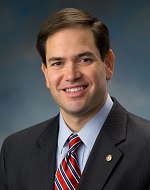 |
| Sen. Marco Rubio |
The drug-pricing debate has moved to the Republican side of the aisle. GOP candidate Sen. Marco Rubio joined the fray in New Hampshire over the weekend, by slamming "pure profiteering" by drugmakers that charge what the market will bear.
Why do pharma companies raise prices? "It's because their argument is we can--we can raise prices on this, the market will bear it, people like this drug, they rely on it, their physician will write it. And so because we can, we do. And it's just pure profiteering."
Later, Rubio's campaign backed away slightly, saying that the candidate hadn't meant to target the entire pharma business, just the misbehaving companies. "Marco was obviously talking about specific companies who are gouging consumers," spokesman Alex Conant told Politico. "America's pharmaceutical industry saves countless lives but it's no secret that there are some bad actors who put profits ahead of patients."
Certainly, some egregious price hikes have captured media attention over the past month, including Turing Pharmaceuticals' 5000%-plus increase on the toxoplasmosis drug Daraprim, and a couple of triple- and quintuple-size hikes by Valeant Pharmaceuticals ($VRX). But one of the practices that Rubio cites--raising prices as a drug loses market share--is common across the industry. The Wall Street Journal cites the example of Biogen ($BIIB), which doubled sales of its older multiple sclerosis drug Avonex to $2 billion over 10 years, despite declining script numbers each of those years.
Then there's the last-ditch sales strategy, when drugmakers raise the prices on products nearing the end of their patent lives--sometimes to collect as much from the brand as possible before generics hit, sometimes to push consumers to newer, extended release, patent-protected versions, and sometimes both.
Top drugmakers have chalked up hundreds of price hikes, with Allergan ($ACT) raising the prices on 50 of its brand-name drugs so far this year this year, by an average of 12.5%, Deutsche Bank says. Merck & Co. ($MRK) has hiked prices on 27 of its meds this year; Pfizer ($PFE) has raised prices on 51 brands; and Eli Lilly ($LLY) on 16 of them. Valeant outranks them all with 56 price increases, averaging 65%, Deutsche Bank says.
Still few analysts expect real action against drug pricing, despite political proposals from Democratic candidates Hillary Clinton and Sen. Bernie Sanders. But several posit that companies will try to avoid controversy by policing themselves.
It is likely that "companies will increasingly 'self-regulate' pricing increases going forward amidst the increasing scrutiny," City analyst Andrew Baum wrote in an investor note. And Tim Anderson of Bernstein & Co. predicts the same thing.
It's already happening, actually; Valeant CEO J. Michael Pearson says the company will no longer make "underpriced" drugs part of its M&A strategy, and predicts that price increases will be limited to 10% per year.
- check out the Rubio video
- see the Politico piece
- get more from the WSJ
Special Reports: 10 big brands keep pumping out big bucks, with a little help from price hikes | The top 10 most expensive drugs of 2013